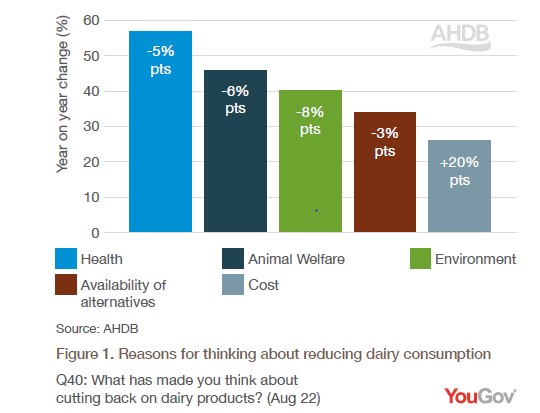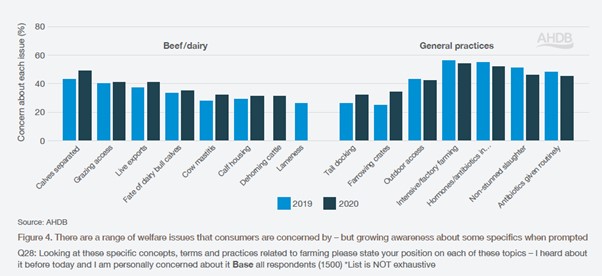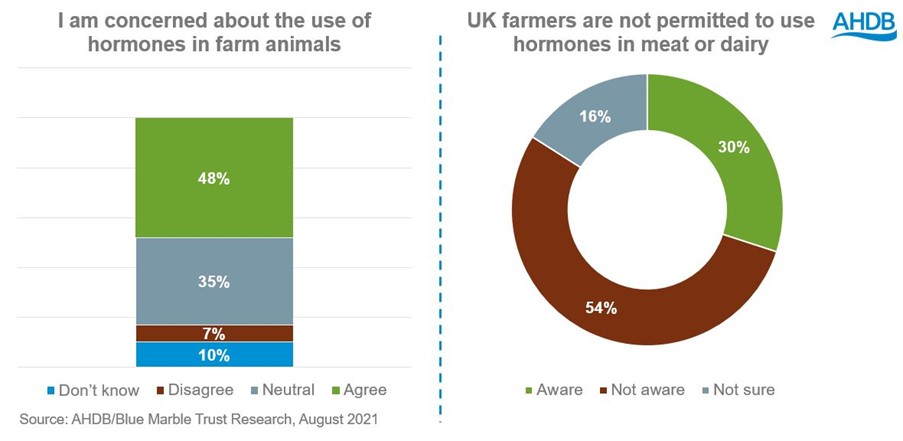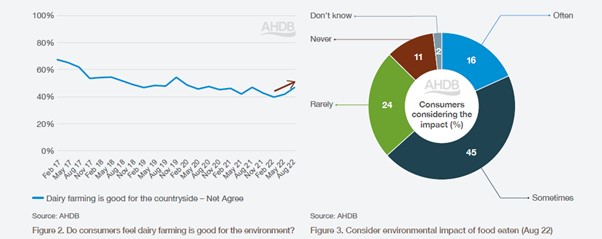Reputation factors outweigh cost as a reason for reduction of dairy
Friday, 10 February 2023
Consumer opinions of the reputation of dairy play a critical role in informing their purchasing decisions. Although cost is increasingly influential, for dairy it still takes a back seat to health, animal welfare and the environment as key drivers of dairy reduction.
Recent years have seen some shifting in consumption in the dairy category with some consumers reporting they are thinking about reducing their dairy consumption. This echoes a longer term trend away from liquid milk and towards processed dairy such as cheese. At the same time the emergence of ever-more products entering the alternative space have also put pressure on the sector. Whilst still only making up 6% of category volume according to Kantar, this has grown from 4% in 2019 although there are now signs of stabilisation as the cost-of-living crisis bites.
The role of health
Health is by far the biggest reason cited for dairy reduction at 57% (Source: AHDB/YouGov consumer tracker Aug 2022), this can vary from weight loss to lactose intolerance. It is therefore vital that communications highlight the role that dairy can play in a healthy, balanced diet and also remind of the nutrients available in dairy from calcium and protein to vitamin B12. Health can come under pressure when the economy is weak and we are seeing signs that health, is becoming slightly less important over time but it still remains the biggest reputational factor.

Animal welfare
Animal welfare concerns have been fairly consistent over time as a driver for dairy reduction. Pressure groups see this as an emotive subject that is easy to tap into with expose videos and misrepresentation of the industry. 46% of consumers cutting back are doing so for welfare reasons.
Specific welfare issues of concern for consumers range from the importance of outdoor access, the overuse of antibiotics, cow-calf separation (and the fate of bull calves) to more health related issues such as lameness and mastitis. Mutilations such as dehorning are also of concern when prompted.

Frequently consumers have been misinformed by pressure groups about British production standards. For example, 48% of people are concerned about the use of artificial hormones in farm animals and antibiotics finding their way into British food when in fact the use of hormonal growth promotants in meat production has been banned in the European Union since 1989 – and has been incorporated into UK law recently as part of its withdrawal from the EU. But only 30% of consumers are aware that UK farmers are not permitted to use growth hormones (Source: AHDB/Blue Marble Aug 2021).

There is an important role to play, therefore, in tackling untruths and misinformation spread by other parties. AHDB has played a key role in this as can be seen by the response to misleading advertising by both Oatly and Meatless Farm.
The environment
40% of consumers reducing their dairy consumption are doing so for environmental reasons. Five years ago around two-thirds of consumers felt that dairy farming was good for the environment, in recent months this has dropped to less than half. We have seen some relief here in recent months. As consumers are more concerned with day to day expenses we have observed less attention being paid to environmental concerns and therefore more positivity around dairy farming. However, the majority of people (63%) feel they consider the environmental impact of the food that they eat so we should consider the reprieve to be brief (Source: AHDB/YouGov Aug 2022). According to a Blue Marble study in Sept 2022 19% of consumers believe farming in the UK has a negative impact on the environment. Awareness of the Net Zero initiative is also fairly low amongst consumers (24%) showing that there is merit in communicating environmental initiatives such as Net Zero and tree planting on farm to highlight progress being made by the sector.

Retaining trust in the industry
Ongoing research by research agency Blue Marble in conjunction with AHDB has consistently found that farmers are the most trusted part of the supply chain, had and shoulders above retailers, food processers and government agencies. This trust is an incredibly valuable commodity and forms part of the social “license to operate” that farmers enjoy. It is vital that we as an industry prioritise protection of that consumer trust and tackle issues that could negatively impact dairy reputation as they emerge.

Sign up to receive the latest information from AHDB
While AHDB seeks to ensure that the information contained on this webpage is accurate at the time of publication, no warranty is given in respect of the information and data provided. You are responsible for how you use the information. To the maximum extent permitted by law, AHDB accepts no liability for loss, damage or injury howsoever caused or suffered (including that caused by negligence) directly or indirectly in relation to the information or data provided in this publication.
All intellectual property rights in the information and data on this webpage belong to or are licensed by AHDB. You are authorised to use such information for your internal business purposes only and you must not provide this information to any other third parties, including further publication of the information, or for commercial gain in any way whatsoever without the prior written permission of AHDB for each third party disclosure, publication or commercial arrangement. For more information, please see our Terms of Use and Privacy Notice or contact the Director of Corporate Affairs at info@ahdb.org.uk © Agriculture and Horticulture Development Board. All rights reserved.

